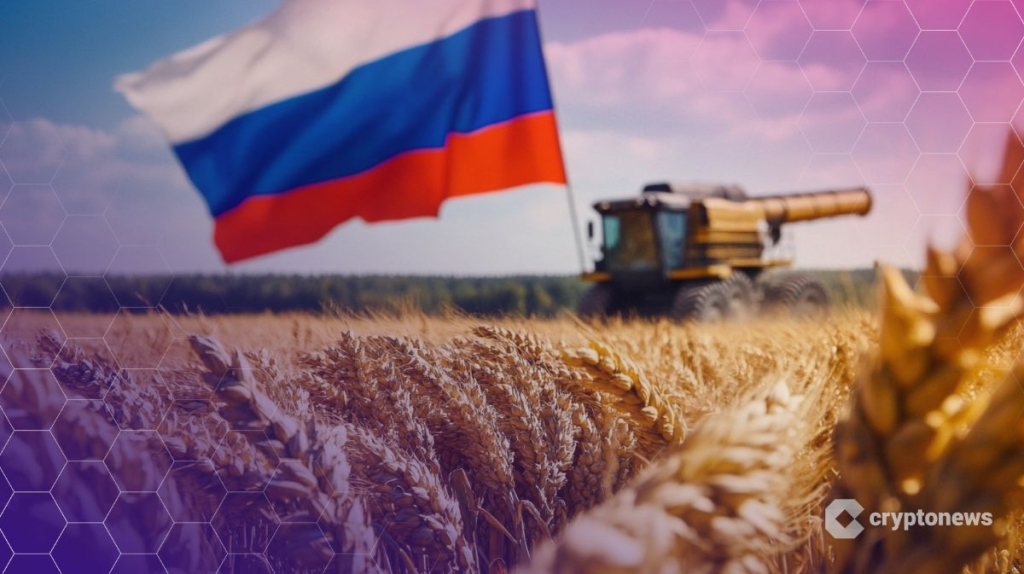Key Takeaways:
Russia is investigating the use of cryptocurrency payments for grain exports as a means to circumvent sanctions and restrictions imposed by SWIFT.
This initiative is in line with the BRICS coalition’s objective to lessen dependence on Western financial systems.
The Central Bank of Russia has now approved a limited access framework for qualified investors regarding crypto-linked derivatives, subject to strict regulatory conditions.
In a strategic move to modernize its trade operations, Russia is researching the potential for cryptocurrencies to facilitate payments for grain exports, aiming to overcome the challenges posed by Western sanctions.
On June 2, the Russian Agricultural Bank (RusAg) announced its collaboration with the Bank of Russia to investigate digital asset payment solutions specifically for grain exports.
According to Irina Zhachkina, RusAg’s First Deputy CEO, cryptocurrencies offer a “convenient alternative instrument” for cross-border payments, particularly as ongoing sanctions constrain Russia’s access to conventional financial systems.
Sanctions Squeeze Russia’s Grain Exports as SWIFT Access Tightens
Restrictions on logistics, shipping insurance, and access to the SWIFT banking network have significantly impacted Russia’s grain exporters.
These limitations increasingly hinder Russian firms from executing transactions in U.S. dollars or euros.
In response, cryptocurrencies are emerging as a viable alternative owing to their decentralized nature.
This effort builds on Russia’s previous experience utilizing cryptocurrencies like Bitcoin (BTC), Ethereum (ETH), and Tether (USDT) to facilitate oil trade with countries such as China and India.
Moreover, the crypto initiative corresponds with a broader de-dollarization strategy among BRICS countries.
President Vladimir Putin has recently proposed establishing a BRICS grain exchange along with a cross-border payment system that utilizes alternative currencies or digital assets.
Such initiatives resonate with ongoing efforts across developing nations to decrease dependence on financial systems dominated by the West.
Russia is setting up two Cryptocurrency exchanges—one for international trade, one for Russian — alongside its own stablecoin. Wave "bye" to another aspect of sanctions. pic.twitter.com/QnKyxGogNp
— James Porrazzo (@JamesPorrazzo) August 23, 2024
Several BRICS members, including China and Brazil, have shown interest in implementing blockchain solutions for commodity trading.
A cryptocurrency-based grain settlement system could enhance resilience and serve as a sanction-resistant payment method for BRICS nations, potentially paving the way for broader adoption in global commerce.
Despite the growing traction for this concept, its implementation is still in preliminary stages, facing regulatory hurdles and the inherent volatility of cryptocurrency markets. Some trade partners may also show reluctance to engage.
Further legal ambiguities exist regarding the taxation, reporting, and enforcement of cryptocurrency transactions in international trade contexts.
Russia Allows Limited Crypto Derivatives Trading for Qualified Investors
In a recent development, Russia’s central bank announced that it would permit qualified investors limited access to crypto-related financial products.
This new guidance allows banks and financial institutions to offer derivatives and securities linked to cryptocurrency prices, though they must be non-deliverable and settled in fiat currency.
The Bank of Russia stressed the importance of a cautious approach, mandating that institutions fully cover exposures and adhere to strict risk limits.
Additionally, the central bank intends to introduce formal regulations within the next year to address risks associated with crypto market volatility.
While this signifies a shift in Russia’s regulatory stance, direct purchases of cryptocurrencies remain prohibited.
Furthermore, the government is contemplating a pilot framework that would enable certain investor groups to engage in cryptocurrency transactions within a tightly controlled environment.
In April, the Finance Ministry and the central bank began to outline plans for a state-operated crypto exchange.
This new platform will function within Russia’s experimental legal framework for financial innovations and will be accessible only to “super-qualified” investors.
The post Russia Explores Using Crypto for Grain Export Payments to Bypass Sanctions appeared first on Finance Newso.


























